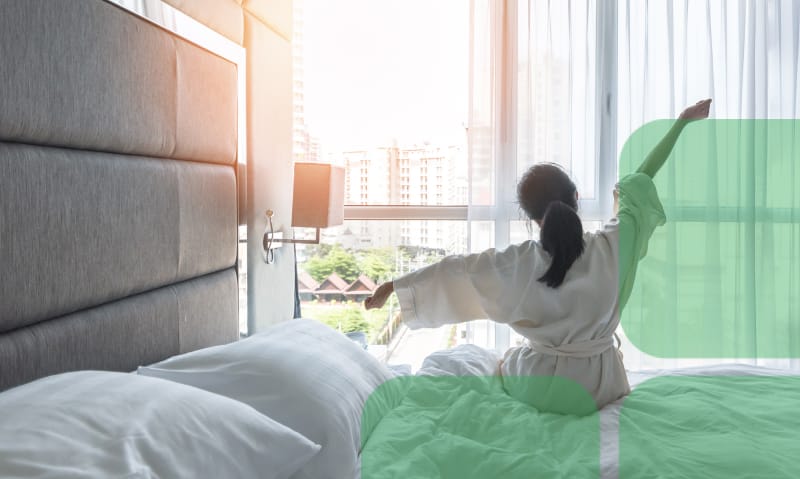7 Ways To Ensure You Get the Best Night’s Rest

Follow these sleep tips to get at least seven hours of sleep each night.
According to the Centers for Disease Control and Prevention (CDC), more than a third of American adults are not getting enough sleep regularly. It can be hard on our bodies when we don’t get at least the recommended seven hours of sleep each night. Not only does this make it harder to focus at work or school, but sleep deprivation is linked to many chronic health problems, including diabetes, heart disease, high blood pressure, stroke, kidney disease, obesity, and depression. So if you aren’t getting enough rest each night, consider these sleep tips to sleep better and wake up refreshed.
Sleep is crucial to your health for many reasons, and when we’re sleep deprived, it increases our likelihood of developing certain health conditions. And as we sleep, there are various restorative processes underway, such as:
- Tissue repair and growth. Our bodies release hormones while we sleep that repair and regenerate damaged tissues.
- Memory consolidation. Our brain replays and strengthens newly formed memories to better retain and recall information.
- Detoxification. Our bodies flush out accumulated toxins and waste products.
- Energy conservation. We conserve energy by reducing metabolic activity and conserving our glucose and other energy sources.
- Hormone regulation. We release hormones that help us manage our metabolism, appetite, and stress.
- Emotion management. Adequate rest helps us become less reactive and build empathy and intimacy, which can help us in personal and professional relationships.
When you don’t get enough sleep, however, your body misses out on the benefits from these various processes. Check out these 7 tips to help you get a better night’s sleep.
1. Go to bed at the same time every night.
Not only is it essential to get enough sleep every night, but maintaining a bedtime can be helpful in other ways too. For instance, it helps to regulate our circadian rhythms, improves our sleep quality, aids our focus, and helps reduce stress. But it doesn’t end there. It can even help us avoid sleep disorders such as insomnia and sleep apnea.
So pay attention to your natural circadian rhythm. Go to bed when you naturally feel tired instead of trying to go to sleep hours before. Forcing yourself to sleep can lead to insomnia and staying awake even later. If you find you tend to fall asleep at 11 p.m., go to bed at 11 p.m., etc.
2. Let that sunshine in.
When you wake up in the morning, one of the first things you should do is open those curtains to let the sunshine in. Exposure to natural light in the morning helps regulate your circadian rhythm, suppresses your body’s natural melatonin, and helps you be more alert and energized.
3. Limit screen time before sleep time.
The number of mobile devices operating worldwide is around 15 billion, projected to reach over 18 billion by 2025. And there’s no doubt that Americans love their devices and the convenience they offer. But when our noses are in our phones for too long before bed, it can be overstimulating, making it hard to sleep. The National Sleep Foundation recommends to stop using electronic devices, like cell phones, at least 30 minutes before bedtime.
4. Adjust your thermostat.
The Sleep Foundation also suggests keeping your thermostat set between 60 to 67 degrees Fahrenheit for the most comfortable sleep. Our bodies are naturally programmed to undergo a small dip in core temperature during the evening. Turning the thermostat down when it is time for bed can help regulate temperature and signal to your body that it’s time to get some sleep.
5. Get checked for sleep apnea.
Sleep apnea is the most common sleeping disorder globally, impacting about 30 million people in the U.S. alone. It’s often associated with loud snoring, gasping or choking during sleep, excessive daytime sleepiness, morning headaches, and irritability. If you’ve followed the rest of our sleep tips and have one or more of these conditions, you may have sleep apnea. Request an appointment with your doctor to find out if you have sleep apnea, and be sure to inform your dentist near Greensboro, North Carolina, of your diagnosis.
6. Stop grinding your teeth.
Grinding and clenching your teeth at night, referred to as sleep bruxism, can be harmful not only to your dental health but also to your overall well-being. Bruxism can cause jaw pain, trigger headaches, and disrupt your sleep. If you think you are experiencing bruxism at night, let us know. We can fit you with a custom mouth guard to keep your teeth from interacting with one another when you are trying to catch some z’s.
7. Have a blue light filter automatically turn on at a certain hour each night.
The blue light filter is available on many electronic devices, such as smartphones, tablets, and computers. It reduces the amount of blue light emitted by the screen, which can impact our sleep patterns. Blue light disrupts the body’s natural sleep-wake cycle by suppressing the natural production of melatonin, a sleep-regulating hormone. Set your filter to turn on about one hour before bedtime.
Let your dentist near Greensboro, North Carolina, know if you are having trouble sleeping at night.
If you’ve tried our sleep tips and you’re still having trouble waking up rested, let us know. We’ll conduct a thorough oral evaluation to look for signs of bruxism and sleep apnea that could keep you from sleeping. And though only your doctor can diagnose sleep apnea, we can help with oral appliances to help you get a better night’s sleep. Request an appointment with Farless Dental Group today.